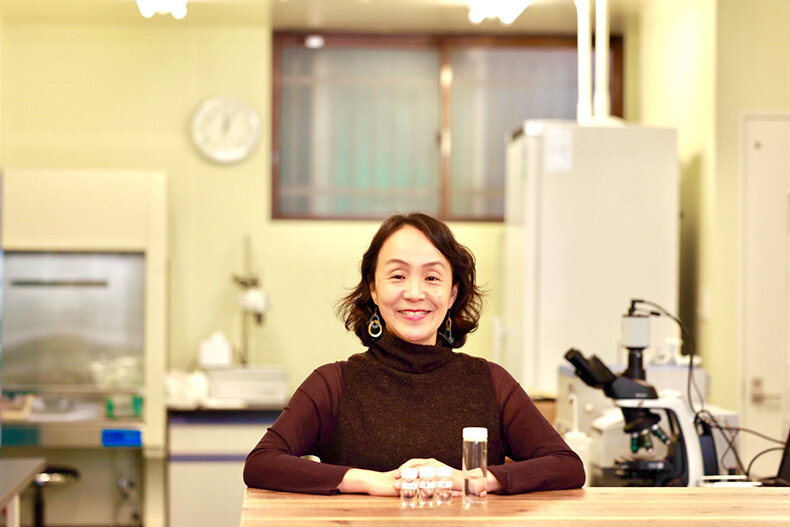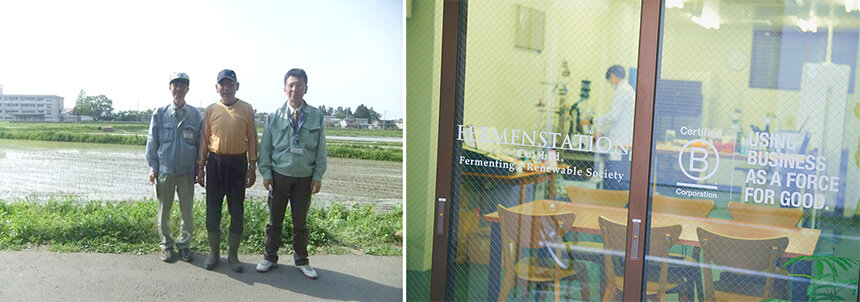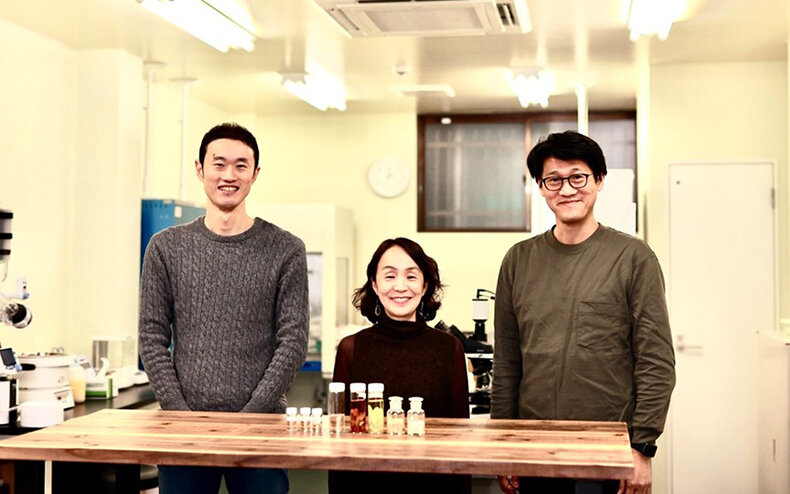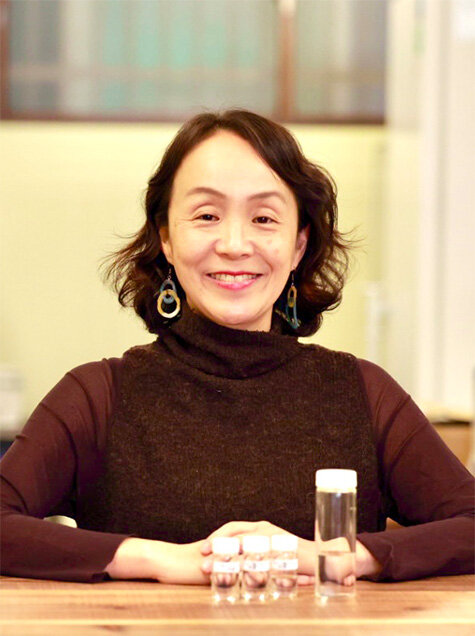Founder & CEO, Fermenstation Co., Ltd.
1995 B.A. in Arts and Sciences (International Relations)
In Pursuit of “My Passion” and “Making the World a Better Place” -- Discovery of the World of Fermentation

Creating a Sustainable Society Through the Power of Fermentation
I currently run a company called "Fermenstation," which uses fermentation technology to upcycle unused resources into new products and services. For example, we ferment rice grown in disused rice paddies, crops that do not meet market specifications, and residual pulp from juicing to produce ethanol and other functional materials that can serve as raw materials for products such cosmetics. The fermentation residues (lees) are then used as livestock feed, and the manure generated by the animals is then returned as fertilizer to the fields. Like this, our goal is to help make this kind of sustainable cycle an established feature of our society.
When I launched my business in 2009, the concept of sustainability was not as prevalent as it is today. We couldn't sell the ethanol we made due to its high price, and when we explained our business model, we were always told that our products lacked market viability. For a long time, we struggled to raise funds, but nevertheless we persevered, confident that sooner or later our time would ripen. With the SDGs now established and greater public awareness about ethical consumption, the current trends seem to be working very much in our favor.
Food loss is not the only social challenge that we can tackle through our business. Since fermentation technology enables the production of alternatives fuels to replace fossil fuels and promote petroleum-free manufacturing, it also helps to combat global warming. Our technology has the potential to address a wide range of global-scale problems. I find it very rewarding to take on such important challenges.
Ever since I founded the company, I have felt a deep-rooted urge to build a business that is both a profitable enterprise and a vehicle for a social cause. Many people are skeptical about the feasibility of balancing the two, which makes it all the more important for us to succeed, to prove that it is possible. We are committed to expanding our business both domestically and internationally with the goal of building a circular society.
A Feeling that All the Puzzle Pieces Fitting at Once
I was interested in going to ICU, with its beautiful campus, when I was in junior high school. I heard that ICU students are required to study hard, but that too attracted me. I thought that such a serious environment would be good for me, by preventing me from wasting too much time on enjoyment. Another reason I wanted to enter ICU was the unique entrance exam questions, designed to test for thinking ability. That made me feel that I could do a lot of interesting learning at ICU.
Something that surprised me when I entered ICU was the diversity of students. I came from an all-girls high school, so I lived in a somewhat closed environment before graduating high school. At ICU, on the other hand, there were people with a variety of interests from all over Japan and around the world. They respected and communicated with each other as equals. I was greatly impressed by the fact that everyone could be so open. I tend to be interested in people who are unusual in some way. I think they are the ones who will most likely bring about change to the world. I have no doubt that this sense was nurtured in me during my time at ICU.
Many students at ICU want to make the world a better place. I took a variety of courses with this same motivation. I was particularly impressed by the overseas fieldwork class taught by Prof. Yozo Yokota of the (then) Division of International Relations. After choosing a study theme, we traveled abroad for about three weeks of fieldwork and then wrote a paper in English. It was a very stimulating experience. Still, by the end of my time at ICU, I still had not found what I really wanted to do, so I decided to take a job with a bank that was recommended to me by one of my seniors at ICU.
At the bank, I gained a lot of experience that would help me later in my career. When I was seconded to the Japan Foundation to work on NPO support projects, I learned that there were companies that addressed social challenges. This experience inspired me to start my current business activities. It was also very valuable for me to learn about environmental assessment from the standpoint of financing energy development and infrastructure projects. Since infrastructure development and similar large-scale projects have a big environmental impact, they need to be evaluated from the viewpoint of environmental risk as well as profitability. I found this interesting and started to feel that I wanted to work in fields related to environmental issues.
Although my work at the bank was fulfilling, I really wanted to do something I was more suited to and passionate about, so I left after six years. I then worked for several other companies and found each experience stimulating, but I failed to discover any kind of work that gave me a deep sense of purpose. While my friends at ICU were steadily climbing their career ladders, I was not even sure of what career path I should take. I remember feeling a strong sense of frustration. Around that time, while on an overseas business trip, I ordered a room service meal that included far more pasta than I could eat. Realizing that so much pasta would end up as food waste, I was overcome by a sense of doubt. The thought of living in a society that generates huge volumes of food waste disturbed me. "Is this the way it has to be?" I thought.
Around this time, I happened to catch a TV report on some research at Tokyo University of Agriculture on fermenting food waste and converting it into energy. Through the power of fermentation, much of the abundant waste in the world can be transformed into something useful. It felt like many disjointed pieces of a puzzle had suddenly clicked to form a picture. I had a gut feeling, "This is it!"
Without any hesitation, I quit the company I was working for and enrolled myself at Tokyo University of Agriculture. Although my work colleagues were surprised by my choice, my old ICU friends were supportive, saying, "Sounds interesting," or "Great!" After studying fermentation technology for four years single-mindedly, in 2009, I launched the business. Through a connection with a research lab at the university, Fermenstation took its first step as a company by accepting a commission to conduct a demonstration experiment with Oshu City in Iwate Prefecture aimed at promoting local recycling by producing ethanol and livestock feed from rice.

Left photo: farm producers and city hall staff / Right photo: Company
My Whole of Way of Life Has Been Shaped by ICU
When I tell my friends about my company and its business, they often say that it seems "very ICU-like." Perhaps there are some similarities with ICU in the organizational culture, in the sense that we value the individuality of all employees, and in our business activities, which span a wide range of fields.
The stakeholders of Fermenstation are also very diverse. They include crop and livestock farmers, food and beverage companies, apparel companies, and consultants. Since every industry has a different culture and style, we face serious difficulties at times, but by approaching everything with a sense of curiosity and openness, the work is always very enjoyable. When we absorb a variety of knowledge and perspectives without preconceptions, it has a positive impact, both on the company, and on ourselves. Undoubtedly, I developed this attitude at ICU. More surprisingly, I also realize that my whole way of life has been shaped by ICU.
Until I encountered the field of fermentation, I passed through a long and difficult period, unable to find what I wanted to do. That is why, based on my experience, I would advise other younger ICU students or alumni to be patient. "Don't be in a hurry to discover what you really want to do! It may take time."
I get the feeling that with many internship opportunities available before graduating, today's university students are expected to start thinking about their future career at a very early stage. However, goals change over time, and no matter how much you think over something, the right answer may not come immediately. That's why I suggest keeping your antennae up and remaining open to yourselves and your surroundings, never giving up on finding what you want. Just keep reflecting! "What do I really want?" "What am I uniquely suited to?" I believe that finding something that you are truly passionate about will enrich your life greatly.

With members of Fermenstation
Profile
Lina Sakai
Founder & CEO, Fermenstation Co., Ltd.
1995 B.A. in Arts and Sciences (International Relations)
After graduating from International Christian University (ICU) with a major in International Relations in March 1995, she worked for The Fuji Bank, Limited and Deutsche Securities Inc., among other companies. After becoming interested in fermentation technology, she enrolled in the Department of Fermentation Science (Faculty of Applied BioSciences) at Tokyo University of Agriculture (TUA). After graduating from TUA in March 2009, she founded Fermenstation Co., Ltd.




